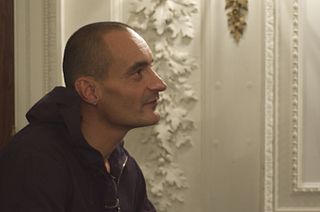A Quote by Bernadette Roberts
In some ways, all our experiences of God are beyond belief, because all conceptual beliefs pale when compared to the experiential reality.
Related Quotes
Yoga is existential, experiential, experimental. No belief is required, no faith is needed - only courage to experience. And that's what's lacking. You can believe easily because in belief you are not going to be transformed. Belief is something added to you, something superficial. Your being is not changed; you are not passing through some mutation.
In addition to pumping the blood of life within our bodies, we may think of the heart as a belief-to-matter translator. It converts the perceptions of our experiences, beliefs, and imagination into the coded language of waves that communicate with the world beyond our bodies. Perhaps this is what philosopher and poet John Mackenzie meant when he stated, "The distinction between what is real and what is imaginary is not one that can be finely maintained ... all existing thing are ... imaginary."
A religious belief is not a statement about Reality, but a hint, a clue about something that is a mystery, beyond the grasp of human thought. In short, a religious belief is only a finger pointing to the moon. Some religious people never get beyond the study of the finger. Others are engaged in sucking it. Others yet use the finger to gouge their eyes out. These are the bigots whom religion has made blind. Rare indeed is the religionist who is sufficiently detached from the finger to see what it is indicating - these are those who, having gone beyond belief, are taken for blasphemers.
Beliefs create behaviors, and the dysfunctional behaviors of the human race, observable everywhere every day, are the product of our non-workable beliefs. Chief among these is the belief in separation, which has arisen out of our ancient Separation Theologies. This is a way of looking at God that insists that we are "over here" and God is "over there."
To make our position clearer, we may formulate it in another way. Let us call a proposition which records an actual or possible observation an experiential proposition. Then we may say that it is the mark of a genuine factual proposition, not that it should be equivalent to an experiential proposition, or any finite number of experiential propositions, but simply that some experiential propositions can be deduced from it in conjunction with certain other premises without being deducible from those other premises alone.
I think our brains does have a tendency to be true to its own ideas and statements. Everything we do and everything we think about is a belief. Until we get to the point where we look beyond our own ego-self, and to some degree beyond our own mind, we are always going to make assumptions and have beliefs to make our brains feel more comfortable. And if we can get to a point where we embrace that uncertainty and doubt, and be willing to learn from that and to explore that, I think that that could be a very positive experience.
The birth of excellence begins with our awareness that our beliefs are a choice. We usually don't think of it that way, but belief can be a conscious choice. You can choose beliefs that limit you, or you can choose beliefs that support you. The trick is to choose the beliefs that are conducive to success and the results you want and to discard the ones that hold you back.
Pragmatism asks its usual question. "Grant an idea or belief to be true," it says, "what concrete difference will its being true make in anyone's actual life? How will the truth be realized? What experiences will be different from those which would obtain if the belief were false? What, in short, is the truth's cash-value in experiential terms?
A belief in God may not be fully within me anymore, but there's still a belief in belief. The high drama and power of the Church has stayed with me. As a child in church, I saw grown men at the altar crying out for God's mercy. And the idea of someone doing that has become a joke in the popular culture, but when you are there and you see it, you experience - for a moment - an incredibly raw, honest, strange insight into what it means to be a human being. Those experiences don't leave you. Whatever you think of them, they are powerful experiences.
So long as knowledge goes beyond mere true belief, foreknowledge is implausible, since having and relying on relevant true beliefs is sufficient for inquiry. A stepping-stone version of prior true belief seems reasonable, though perhaps we should accept only an even weaker view: a stepping-stone version of roughly-accurate beliefs.
We believe in the joy and power of music, and we also see that to make this kind of statement today, you need to be a hero, because there are more dominant beliefs - like the belief in power itself or in fame or in money. Our belief in the power of music is something that really needs a strong position in order to keep it up for a lifetime - and hopefully even beyond. We don't want to miss out on the chance to give food for thought to other generations that may relate to it in a way that is not yet foreseeable.
































